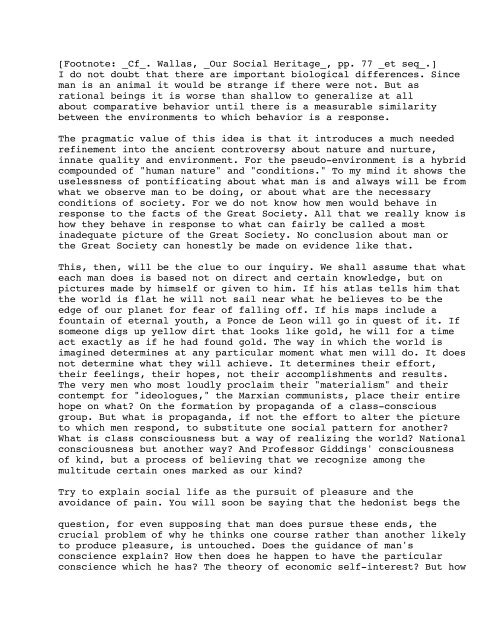PUBLIC OPINION by WALTER LIPPMANN TO FAYE LIPPMANN ...
PUBLIC OPINION by WALTER LIPPMANN TO FAYE LIPPMANN ...
PUBLIC OPINION by WALTER LIPPMANN TO FAYE LIPPMANN ...
Create successful ePaper yourself
Turn your PDF publications into a flip-book with our unique Google optimized e-Paper software.
[Footnote: _Cf_. Wallas, _Our Social Heritage_, pp. 77 _et seq_.]<br />
I do not doubt that there are important biological differences. Since<br />
man is an animal it would be strange if there were not. But as<br />
rational beings it is worse than shallow to generalize at all<br />
about comparative behavior until there is a measurable similarity<br />
between the environments to which behavior is a response.<br />
The pragmatic value of this idea is that it introduces a much needed<br />
refinement into the ancient controversy about nature and nurture,<br />
innate quality and environment. For the pseudo-environment is a hybrid<br />
compounded of "human nature" and "conditions." To my mind it shows the<br />
uselessness of pontificating about what man is and always will be from<br />
what we observe man to be doing, or about what are the necessary<br />
conditions of society. For we do not know how men would behave in<br />
response to the facts of the Great Society. All that we really know is<br />
how they behave in response to what can fairly be called a most<br />
inadequate picture of the Great Society. No conclusion about man or<br />
the Great Society can honestly be made on evidence like that.<br />
This, then, will be the clue to our inquiry. We shall assume that what<br />
each man does is based not on direct and certain knowledge, but on<br />
pictures made <strong>by</strong> himself or given to him. If his atlas tells him that<br />
the world is flat he will not sail near what he believes to be the<br />
edge of our planet for fear of falling off. If his maps include a<br />
fountain of eternal youth, a Ponce de Leon will go in quest of it. If<br />
someone digs up yellow dirt that looks like gold, he will for a time<br />
act exactly as if he had found gold. The way in which the world is<br />
imagined determines at any particular moment what men will do. It does<br />
not determine what they will achieve. It determines their effort,<br />
their feelings, their hopes, not their accomplishments and results.<br />
The very men who most loudly proclaim their "materialism" and their<br />
contempt for "ideologues," the Marxian communists, place their entire<br />
hope on what? On the formation <strong>by</strong> propaganda of a class-conscious<br />
group. But what is propaganda, if not the effort to alter the picture<br />
to which men respond, to substitute one social pattern for another?<br />
What is class consciousness but a way of realizing the world? National<br />
consciousness but another way? And Professor Giddings' consciousness<br />
of kind, but a process of believing that we recognize among the<br />
multitude certain ones marked as our kind?<br />
Try to explain social life as the pursuit of pleasure and the<br />
avoidance of pain. You will soon be saying that the hedonist begs the<br />
question, for even supposing that man does pursue these ends, the<br />
crucial problem of why he thinks one course rather than another likely<br />
to produce pleasure, is untouched. Does the guidance of man's<br />
conscience explain? How then does he happen to have the particular<br />
conscience which he has? The theory of economic self-interest? But how





